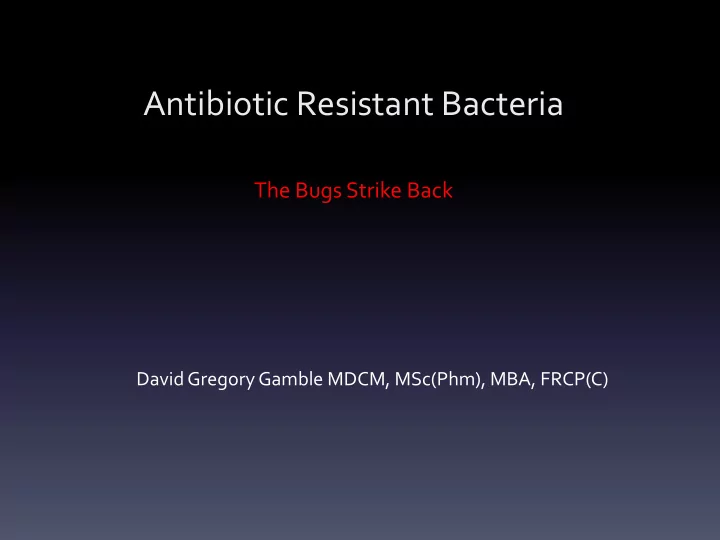

Antibiotic Resistant Bacteria The Bugs Strike Back David Gregory Gamble MDCM, MSc(Phm), MBA, FRCP(C)
Conflict of Interest Declaration Presenter: David Gregory Gamble MDCM Antibiotic Resistant Bacteria The Bugs Strike Back I have no financial or personal relationship related to this presentation to disclose.
Learning Objectives At the end of this presentation, participants will: 1. Be familiar with some of the antibiotic resistant bacteria of concern in Thunder Bay and area 2. Know more about the emerging antibiotic resistant bacteria that will be of concern here in the near future 3. Identify strategies to avoid and manage infections with these bacteria
Session Evaluation and Outcome Assessment These short forms serve important functions! • For MYSELF, responses will help me improve the session to better meet future participant learning needs, and teaching outcomes • For YOU, responses allow reflection on what you’ve learned and how to apply it to enact change as you return to your professional duties • For the CEPD office: – To plan future programs – For quality assurance and improvement – To demonstrate compliance with national accreditation requirements Please take 3-5 minutes to fill the evaluation form out. Thank you!
The Rogues Gallery • Clostridium difficile • Methicillin Resistant Staphylococcus aureus • Vancomycin Resistant Enterococcus • ESBL Gram Negative Rods • CP Gram Negative Rods
Questions to Ponder • Drug resistance isn’t a concern for C.difficile • Most MRSA infections are hospital acquired • Clindamycin is more reliable than TMP/SMX for treatment of MRSA infection in Thunder Bay • VRE bacteremia is treatable and is associated with low mortality • CPE infections have occurred in Thunder Bay already
Canadian Nosocomial Infection Surveillance Program (CNISP) • Collaboration between AMMI and PHAC • Established in 1994 to provide rates and trends of healthcare associated infection, thus enabling benchmarking • 54 sentinel hospitals from 10 provinces • CNISP Summary Report of HAI, AMR and AMU Surveillance Data from Jan 1, 2013 to December 31, 2017 – PHAC Website
CNISP HA-C. Difficile Rates 2013 -2017
HA versus CA CDI (CNISP) 2012 - 2017
Monthly TBRHSC Acquired C. difficile Infection Rates January 2017 to January 2019 Infection 0.70 0.60 0.50 Rate per 1,000 patient days 0.40 0.30 0.20 0.10 0.00 Month
HA-C. difficile Antibiotic Resistance (CNISP) 2013 - 2017
C. difficile Strains (CNISP) 2013 - 2017
Canadian CDI Treatment Guidelines 2018
Fidaxomicin • Bactericidal agent, minimally absorbed from the gut • Gram positive activity • Inhibits RNA polymerase • Lower relapse rates at 30 days
C. difficile Management Strategies • Early detection and treatment • Avoiding colonization – Antibiotic stewardship – Isolation protocols – Environmental cleaning – Modern physical plant
Total MRSA Infection Rates (CNISP) 2013-2017
MRSA Infection Rate by Origin (CNISP) 2012-2017
Circulating MRSA Strains (CNISP) 2013-2017
MRSA BSI Rates (CNISP) 2013-2017
All-cause MRSA BSI Mortality (CNISP) 2013-2017
Annual TBRHSC Acquired MRSA Rates 2013-Present Colonization Infection Bacteraemia 0.30 0.25 Rate per 1,000 patient days 0.20 0.15 0.10 0.05 0.00 Month
MRSA Antibiogram (CNISP) 2013-2017
TBRHSC Gram Positive Antibiogram 2017-2018
Management of MRSA Infection • Antibiotic Treatment – Vancomycin – Second line agents • Daptomycin, linezolid • TMP/SMX, doxycycline, clindamycin • Source Control • Avoiding colonization
Daptomycin • Lipopeptide • Depolarizes bacterial membranes • Bactericidal, activity includes MRSA, VRE • Inactivated in lungs, only IV • Issues – Myositis – Eosinophilic pneumonitis
Linezolid • Oxazolidinone (synthetic antibiotic) – Blocks ribosomal synthesis of protein – Bacteriostatic – Excellent tissue penetration IV, po – Activity includes MRSA, VRE – Issues • Serotonergic syndrome/hypertension • Pancytopenia • Optic neuritis
VRE Infection Rates (CNISP) 2013 -2017
VRE Infection Rates By Type (CNISP) 2012 -2017
Annual TBRHSC Acquired VRE Rates FY2013 - Present Colonization Infection Bacteraemia 4.00 3.50 3.00 Rate per 1,000 patient days 2.50 2.00 1.50 1.00 0.50 0.00 Month
VRE Strains (CNISP) 2013 -2017
VRE Sensitivities (CNISP) 2013-2017
VRE Treatment • Antibiotics – linezolid – daptomycin – ?tigecycline • Source control • Prevention of colonization
Gram Negative AROs • Extended spectrum B-Lactamase producing Enterobacteriacae (ESBL) • Carbapenemase producing Enterobacteriacae (CPE) • Carbapenemase producing Acinetobacter (CPA) • Multidrug resistant Pseudomonas aeruginosa (MDR- PA)
Antibiotic Resistance E.Coli (CNISP) 2015 - 2016
TBRHSC Gram Negative Antibiogram 2017-2018
TBRHSC Acquired ESBL Gram Negative Rates FY2013 - Present Colonization Infection Bacteraemia 0.18 0.16 0.14 Rate per 1,000 patient days 0.12 0.10 0.08 0.06 0.04 0.02 0.00 Month
CPE/CPA Isolates (CNISP) 2013-2017
CPE Carbapenemases (CNISP)
CPE Colonization and Infection Rates (CNISP) 2013 -2017
All-Cause Mortality CPE (CNISP) 2013-2017
Antibiotic Resistance CPE (CNISP) 2013 - 2017
CPE Treatment Strategies • Antibiotics – Old antibiotics • Colistin alone or in combination – Under development • Plazomycin (new aminoglycoside) • Ceftazidime/avibactam (and similar BLI combos) • Novel tetracyclines and fluoroquinolones • Phage therapy • Source control • Prevention of colonization
Questions to Ponder • Drug resistance isn’t a concern for C.difficile • Most MRSA infections are hospital acquired • Clindamycin is more reliable than TMP/SMX for treatment of MRSA infection in Thunder Bay • VRE bacteremia is treatable and is associated with low mortality • CPE infections have occurred in Thunder Bay already
Questions
Recommend
More recommend